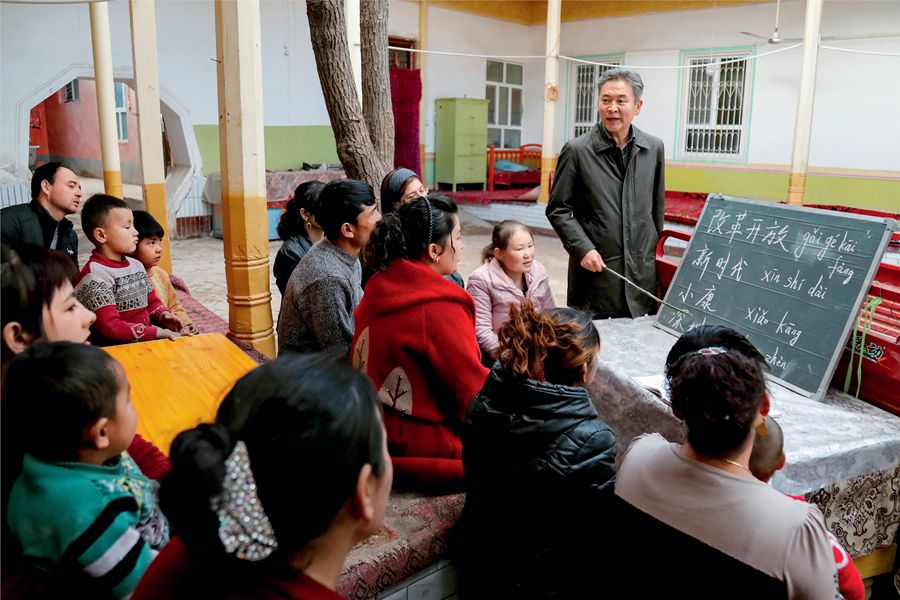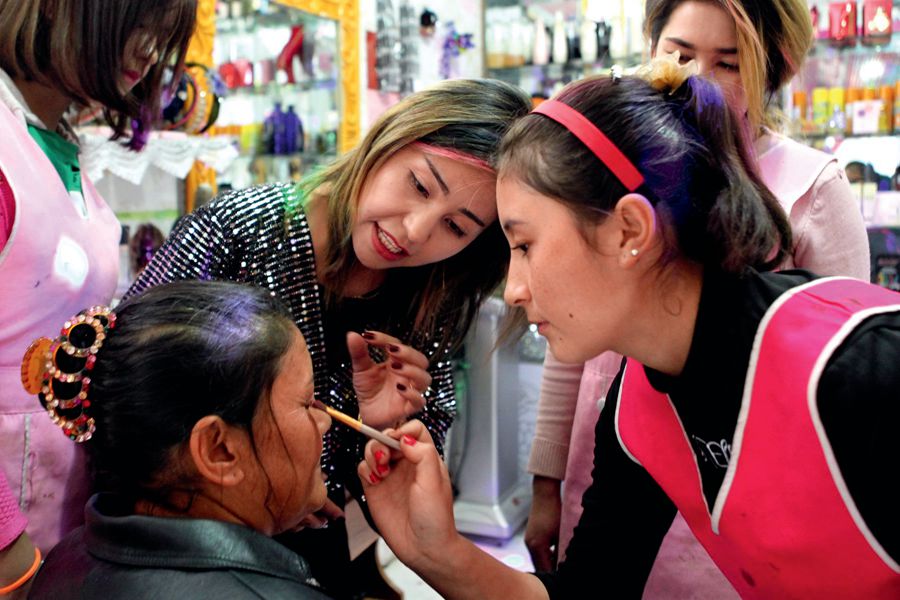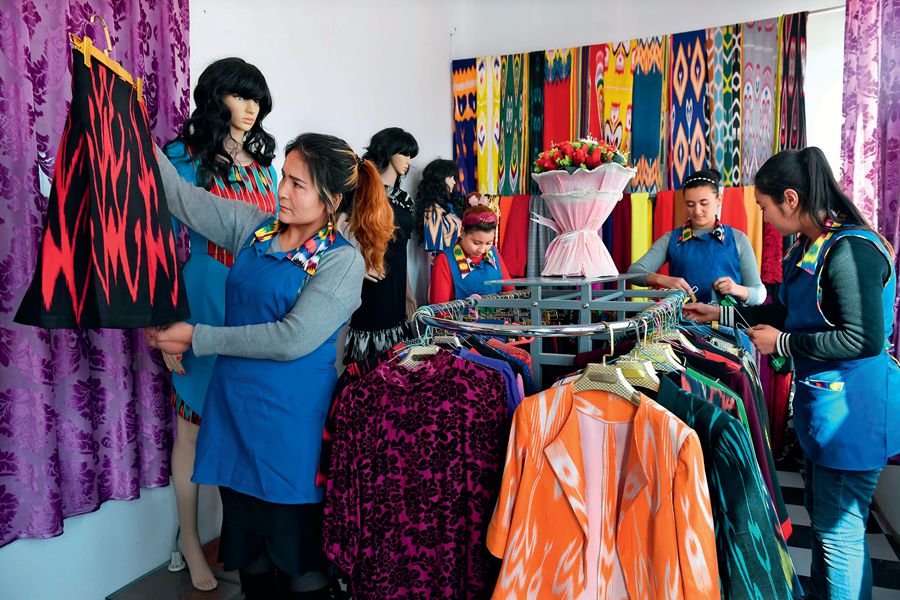THE wallets of the locals are bulging, there is much laughter, people are vigorous and energetic, cultural activities have become enriched, and the lifestyle has become increasingly modernized. A walk through the southern part of Xinjiang Uygur Autonomous Region will enable visitors to spot the varied changes happening in the lives of people of all local ethnic groups.
They support national unity from the bottom of their hearts, and build their beautiful hometowns with full confidence, leading this ancient land to glow with new vigor and vitality.
New Trends
“Sunday Bazaar” in Kadamjay Village, Janbaz Township, Peyziwat County, ushered in a large influx of customers in the warm sunshine.
The parking lot was packed, and the Bazaar was bustling with people, in addition to a variety of commodities and delicacies.
Rahile Hesen, a seller of women’s clothes, had dyed her hair, and applied makeup on her face, looking stylish in her shirt, sweater vest, jeans, and boots.
“The goods, all from Kaxgar City, are of the latest style. The more fashionable they are, the better they sell,” the 25-year-old told the reporter in fluent Mandarin.
Patigul Tash, who was trying to market protein powder by calling out its benefits in a loud voice, came from Merkit County, more than 100 kilometers away. She quickly handed out a leaflet at the sight of the reporter.
“Can farmers accept such products?”
“An increasing number of farmers are gradually accepting them. I have been running a stall here for a year, and all the people who come here are returning customers,” Patigul replied happily.
Squeezing out of the Bazaar drenched with sweat, the reporter strolled through the village, and arrived at the home of Kiremian Ghopur, who was renovating his house, and warmly invited the reporter to his home.
There are nine rooms in Kiremjan’s house, covering a total area of 250 square meters. The ceiling is blue, the furniture is painted white, and the outdoor ceiling and grape rack are all of steel structures.

In Yuqarqi Kapa Village, Saybagh Township, Kona Sheher County, small classes are offered for villagers to learn the national language and writing by members of the team stationed in the Agricultural and Rural Department of Xinjiang Uygur Autonomous Region. Xie Long
“The decorations cost more than RMB 100,000. We demolished the kang (heated adobe sleeping platform), now the house is cleaner.” Kiremjan’s Mandarin is tinted with a trace of Shanghai accent.
Kiremjan began selling mutton skewers in Shanghai in 2002, and made a group of local friends. He returned to the village for a length of time every year. “Now I can accommodate my friends from Shanghai at home.” He demonstrated the benefits of migrating to other cities for work: earning more money, broadening his horizons, making friends, and so on.
“People in the village used to prefer staying at home, but now they want to go out to work. There are dozens of people working outside the region, some going to Urumqi, Ili Kazak Autonomous Prefecture, and Shanghai. Our life will definitely continue to get better and better,” Kiremjan said.
More and more women wear makeup, more peasants migrate to other cities to work, more members of ethnic minorities can speak Mandarin, more people have relatives of different ethnic groups, and rural residents have access to more cultural activities. Murat Gheniyat, director of the Philosophy Research Institute of Xinjiang Uygur Autonomous Region Academy of Social Sciences, has observed these heartening changes in southern Xinjiang.

Zulhumar Hemdulla (middle), who runs beauty and hairdressing chains in Tughchi Township, Kaghiliq County, Kaxgar Prefecture, is teaching villagers cosmetic technique. Yang Bin
“This is true emancipation of the mind; social stability and economic development have profoundly transformed people’s thinking and behavior in southern Xinjiang,” he said.
New Looks
Salam Qadir, a 27-year-old Kaxgar citizen, had just finished a two-month rural job project. “Frequent contact with new things broadens people’s horizons and opens up their minds. In the past two years, rural areas and farmers have undergone significant changes, while cities in southern Xinjiang have become more modernized as well,” Salam said while leading the reporter around the ancient city of Kaxgar.
The Mountain cafe in Kaxgar was full of a strong aroma. “We have freshly ground coffee; in addition to tourists, customers also include local residents. Now even the elderly in the old town will come for a cup of coffee.” The shopkeeper, Mirehmet Turahun, said that several new cafes have opened here this year and business is good.
Obulqasim, 80, kept himself warm by an electric heater in front of his copper art shop. “It’s better than a stove. It’s environmentally friendly and doesn’t pollute the environment.” The stereo in the shop was playing light music. Behind this man who had been engaged in traditional crafts for 67 years was a dazzling array of bright copper artifacts. The scene was like an oil painting.
A small shop called Pretty Girl Hairdo Beauty Salon was ablaze with lights. “What products sell best?” was the question put to the business owner, Galina.

Villagers employed in factories in Hoyla Village, Chaharbagh Township, Lop County, are arranging clothes in the product exhibition hall. Yang Bin
“Beauty and hairdressing products are very popular. Girls nowadays usually wear makeup before going out,” Jialina answered with a smile.
As a large night market had just been built in Kaxgar, the night market in the ancient city was called the “Old Night Market” by Salam. On frequent visits to the night market, the number of smiling new faces keeps increasing – the lady operating the shop selling a snack made of sheep viscera was Ma Asa of the Hui ethnic minority, the stall of spicy hot pot was operated by a newcomer from Sichuan, surnamed Tang. He Ping, a girl of Han ethnicity, said that many ethnic minority residents were fond of her fried tofu, and quite a number of people had become her WeChat friends. Cui Yuying, who sold crayfish and crabs, chatted with the stall owner of Uygur ethnic group nearby and helped him arrange the tableware cheerfully.
“This is a vivid scene of ethnic unity,” said Salam. Salam’s standard Mandarin aroused admiration from the cold noodles vendor who said that he was endeavoring to learn the standard spoken and written Chinese language and striving to speak with such a standard pronunciation.
Ethinic unity is as natural as breathing and as indispensable as air. In rural areas of southern Xinjiang, every household has friends of different ethnic groups. The more they meet, the stronger the bond will naturally become.
New Pursuits
With the improvement of living standards, there are growing demands for richer cultural life. Every rural community that the reporter recently visited was vibrant with rich and colorful cultural activities.
In Towanki Markit Village in Algha Town, Uchturpan County, villagers performed fitness dancing and fashion shows in the ecological park, and laughter echoed under the blue sky. A theatrical performance is staged here every week, and a literature and art competition is held every month. The villagers won the first prize in the county square dance contest.
In Yingitur Village of Hanikatam Township, Kupa County, residents have set up a performance team, and gained mounting popularity after a performing tour for more than a year.
Every night, Gulmele Village, Anakul Township, Maralbeshi County, bustles with noise and excitement. Locals walk out of their homes for leisure and pleasure on the riverside park in the village. Arzigul Imin brings her son every night and savors the moments of watching her child play in high spirits, “Now our life is sweeter than honey!” Muqamhan Yusuf nodded in agreement, “Our homes now become ‘houses with a riverside view,’ and we no longer envy urban residents!”
The village has just broken the shackles of poverty. “The people of southern Xinjiang live in bliss, enjoying the best and most extensive policies across the nation,” Liu Yi, first Party secretary of the village who is from the sports administration of the autonomous region, said with deep emotion. Since the Ninth Party Congress of Xinjiang, the local program to build closer ties between the government and the masses has been intensified, bringing the benefits of the government’s policies to millions of households. The people are consequently more mobilized and motivated to contribute to local development.
At the end of last year, Abduhekim Raziq held his wedding at the service center of his village, Karamet Village, Tusala Township, Hoten County. The wedding was simple, jubilant and quite modern. “The venue is arranged by the village. I just need to invite my relatives and friends and get pilaf, fruits, and pastries ready.” The groom, dressed in a suit, held the bride’s hand in joy as people danced and sang, bestowing their blessings on them. “I am happy to see that my wedding is filled with festive singing and dancing, full of laughter and happiness!” Abduhekim said merrily.
SUI YUNYAN is a journalist of Xinjiang Daily.


